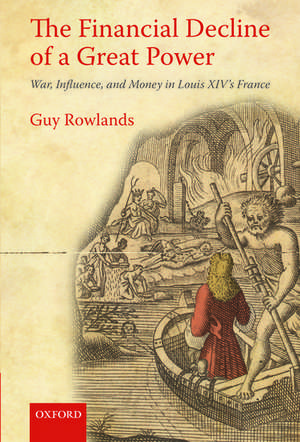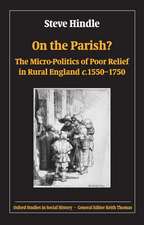The Financial Decline of a Great Power: War, Influence, and Money in Louis XIV's France
Autor Guy Rowlandsen Limba Engleză Hardback – 4 oct 2012
Preț: 818.54 lei
Preț vechi: 1177.07 lei
-30% Nou
Puncte Express: 1228
Preț estimativ în valută:
156.63€ • 163.95$ • 130.36£
156.63€ • 163.95$ • 130.36£
Carte tipărită la comandă
Livrare economică 19-25 martie
Preluare comenzi: 021 569.72.76
Specificații
ISBN-13: 9780199585076
ISBN-10: 0199585075
Pagini: 286
Dimensiuni: 161 x 241 x 22 mm
Greutate: 0.57 kg
Editura: OUP OXFORD
Colecția OUP Oxford
Locul publicării:Oxford, United Kingdom
ISBN-10: 0199585075
Pagini: 286
Dimensiuni: 161 x 241 x 22 mm
Greutate: 0.57 kg
Editura: OUP OXFORD
Colecția OUP Oxford
Locul publicării:Oxford, United Kingdom
Recenzii
... a clear, lucid and easily comprehensible description of how military finance operated in the largest unitary European state of the eighteenth century ... will make this book one of the standard works of reference for all historians of French and European finance and state formation.
In Guy Rowlands's scholarly and spirited new book, we dive into the underworld of French royal finance ... there can be few better guides to this underworld than Rowlands, who leads us to a deeply researched, thoroughly convincing explanation of the how and why of financial breakdown in this period.
A lexical analysis of Rowland's writing makes the grim reality of the story he tells plain. ... Ostensibly focused on the financing of the war of the Spanish succession, this book has many ramifications.
this study provides a sure guide to a bureaucratic labyrinth and a convincing argument that the War of the Spanish Succession was even more of a disaster for France than has generally been believed.
this book fills a crucial gap in the literature. One can only admire the author's ability to piece together disparate elements to document and discuss a number of important, if complex, issues. It will remain a must-read for all interested in Louis XIV's finance and one of Europe's most important conflicts.
Rowlands is meticulous and compelling in describing the gathering of the financial storm that hit France in the final years of Louis XIV's reign, and he employs a wealth of original material to document the interactions between the ministry and the officers of the royal treasury
In Guy Rowlands's scholarly and spirited new book, we dive into the underworld of French royal finance ... there can be few better guides to this underworld than Rowlands, who leads us to a deeply researched, thoroughly convincing explanation of the how and why of financial breakdown in this period.
A lexical analysis of Rowland's writing makes the grim reality of the story he tells plain. ... Ostensibly focused on the financing of the war of the Spanish succession, this book has many ramifications.
this study provides a sure guide to a bureaucratic labyrinth and a convincing argument that the War of the Spanish Succession was even more of a disaster for France than has generally been believed.
this book fills a crucial gap in the literature. One can only admire the author's ability to piece together disparate elements to document and discuss a number of important, if complex, issues. It will remain a must-read for all interested in Louis XIV's finance and one of Europe's most important conflicts.
Rowlands is meticulous and compelling in describing the gathering of the financial storm that hit France in the final years of Louis XIV's reign, and he employs a wealth of original material to document the interactions between the ministry and the officers of the royal treasury
Notă biografică
Guy Rowlands is Director of the Centre for French History and Culture and a Lecturer in the School of History at the University of St Andrews. He is the author of The Dynastic State and the Army under Louis XIV. Royal Service and Private Interest, 1661-1701 (2002), shich was co-winner of the Royal Historical Society's Gladstone Prize (2003). Prior to his appointment at St Andrews he held teaching and research positions at the universities of Oxford, Cambridge, Bristol, and Durham. His research interests span western European history between 1660 and 1800, with particular focus upon politics, war, and finance. He has been a Fellow of the Alexander von Humboldt Foundation (2007-08) and a Senior Research Fellow of the British Academy and Leverhulme Trust (2010-11).













